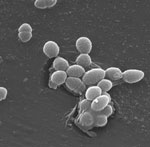
Doctors have known that a medication often prescribed to treat heart failure is inactivated by gut microbes, particularly a bacterial species called E. lenta. Now scientists have a better understanding of why. A Harvard University research team led by Peter Turnbaugh found that the heart drug digoxin turns on two E. lenta genes that help convert the drug into its inactive form, thereby making the medicine less effective. By measuring gene abundance, the scientists could reliably predict whether a microbial community could break down the drug. The researchers also identified a possible way to stop the process: add protein. Their studies using mice showed that a diet high in protein—and the amino acid, arginine, that helps E. lenta grow—increased digoxin absorption. These initial findings suggest that one day it may be possible to tailor digoxin therapy through diet modifications.


I understood that the digoxin activate 2 E. Lenta genes that help inactivate digoxin. So, the article says that protein helps the absorption of the inactive forms? How is that helpful?
Gut flora exists because it has some special functions to perform facilitating the process of digestion and the other physiological process associated with digestion. They have the innate intelligence to identify the quality of substances passing through the GI tract. Anything passing through the GI tract has to undergo the same digestive process like the food and will be submitted to the various enzymatic actions. Some of the drugs can turn into toxin and the gut flora has the intelligence to recognize to inactivate it! The drug Digoxin is known to have many side effects. The gut flora who is the natural inhabitant of the gut will perform its duty of sensing the toxic presence in drugs or food. Why should a drug produce side effect and how effective it is in in real healing is a critical question which is not addressed due to the powerful financial influence of the drug companies. We do not teach in medical schools about healing process and the personal involvement of the healer and the healed. Instead every disease is named and a corresponding drug is discovered. Sometime it can be a reverse process also!
The tragic example of the fecal therapy to counter the catastrophic side effect of prolonged antibiotic therapy is the best example.
The digestive mechanism in rodents does not exactly simulate human digestion. Emotions and influence of consciousness in any physiological phenomena has to be recognized. A gut flora how ever tiny it may be uses its inborn intelligence to perform its function by making the proteins inactive. by shutting off or on the various genes. But does that solve the problem of the side effects of various drugs?